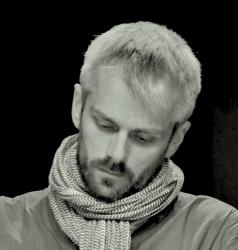
They also had the idea that somehow there might be something worthy about their efforts in constructing a society, and to top the luxury they had the utopian vision of a free, fast and exciting West, a West they could get a glimpse of but never reach, a fantasy-place to long for and hope for, while blaming the government for not actually being there. It was a fulfilling libidinal economy, as Zizek phrases it, his point being that after the fall of socialism, unemployment there is a plenty, poverty, stupidity and nihilism and what’s worse: nowhere in sight is this magical ‘other’ part of the world that you can dream of one day reaching. You live in a system that’s much too fast for you, so it is not ‘they’ but you who are always late, and if you’re not happy still living in that humongous grey Stalinist apartment building, you have only yourself to blame. Capitalist misery has conquered East-Germany as well as the rest of post-traumatic post-socialist East-Europe.
All of it? Not quite … in the North-East of Central Berlin one trendy little neighbourhood still seems to resist the conquerors, in its own perverse way. Prenzlauer Berg, it’s called.
Killing what you love, professionally
The story: When the wall came down, Prenzlauer Berg was full of talented and educated East-German adults who dreamed of nothing so much as becoming part of the ‘normal’ Western middle-class. In a miraculously short time, they evacuated Prenzlauer Berg, leaving the neighbourhood a paradise for punks and radicals who squatted in every other house, while others paid a monthly rent equalling 15-70 Euros. Cultural migration (not to mention cheap rent) creates excitement and soon after the punks and radicals, the students and artists arrived on the scene and were mostly welcomed by the pioneers. But when the students and artists settle in, the designers and architects are lurching around the corner. And after the designers and architects, you start getting people with real money, first yuppies of the cultural sector, then any old yuppie, craving for the sense of reality offered them by the proximity to punks and hipness.
And of course the yuppies kill the thing they love – it’s their job, after all. They repair the houses, fill up the World War II bullet holes that the GDR had seen no reason to hide, bring in central heating, hot water and high-speed internet which increases the value of the houses, the high prices then driving away the punks, then the artists and the students…
Surplus value: Otherwise known as cool
The depressed designers, filmmakers and architects aimlessly roam between cafés designing furniture, logos and websites for each other, thus securing the funds for coffee, late breakfast and cigarettes. As in the late GDR, they produce little of intrinsic value, but seem to be able to squeeze the minimal surplus value out of their talents (the surplus value is otherwise known as cool and has at least as much to do with location as talent). They know there is somehow a reason they live life like they do, there is even something virtuous about it, yet they hate it and blame either the government or the general decay of the universe.
At any given moment they can be expected to sarcastically blurt out: “This is just ridiculous! This city produces nothing! What are you all doing!? How can you all just sit around like that!? Why are you all wearing the same trendy second hand clothes!? How can you call yourself an artist!?” And what’s more, they have a vision about what life should really be like – indeed, what life really is like – it’s only four U-Bahn stations away, in the former West-Berlin neighbourhood of David Bowie, Einstuerzende Neubauten and U2, the biggest Turkish community outside Turkey, a place where real people seem to have real struggles, working hard, moving actual things around and not vector-drawings, pixels and sound-tracks, people who wake up in the morning, and drive a car to work, whose teenage offspring play loud hiphop in those same cars come evening. It’s called Kreuzberg and it’s the fantastical other scene.
The utopian distance of four U-Bahn stations
So the natural and foreseeable work of capital has left the inhabitants of Prenzlauer Berg with the same libidinal structures as their socialist forerunners. Which is the perversity of what on the surface seems like a defence against capitalist nihilism – it is itself the epitome of the surplus society. As the thirtyish individuals sit around with their Latte Macchiatos – lacking neither laptop nor jeans, whatever the status of their bank-account – they speak of the wonders of reality, aka. Kreuzberg. Some actually get duped by themselves and move over. As, once upon a time, some were duped to actually bring in the West. But as an Icelandic poet wrote in an immortal line: “your dream is your fall.” Prenzlauer Berg expats in Kreuzberg realize they made a mistake. Utopia materilised offers nothing but boredom, life takes place in the tension zone. The expat wants to get back to Prenzlauer Berg, curse the yuppies and the hippies alike and praise the immigrants from the utopian distance of four U-Bahn stations.
Buy subscriptions, t-shirts and more from our shop right here!















